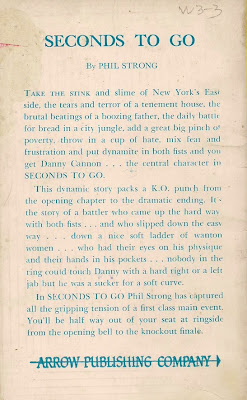Seconds to Go
Phil Strong [pseud. Danny Halperin]
Toronto: Arrow, 1950
Is anything to be made of the similarity between the name Danny Cannon, protagonist of
Seconds to Go, and that of his creator Danny Halperin?
Hope not.
We first catch sight of Danny Cannon at age eleven as he's being beaten by his father Matt. A bat to the head, a fist in the face, whipping with a belt... and who knows what we've missed. But wait, there's more:
Again and again the belt descended.
At last Danny could bear it no longer. Like a caged beast suddenly freed, he turned on his father and wrestled with him for possession of the belt. Matt roared with rage; his meaty right hand clutched the boy's throat and he shook that twisting young body as if it were a rattling bag of coals.
Exhausted, Danny went limp, Matt let him fall to the floor where he kicked him in the stomach. The boy writhed and screamed as the boot connected.
"Now – now – what's yore answer?" said Matt, breathing heavily, laying down a fine mist of whisky breath close to Danny's face.
"I – I'll go."
Where to?
Halperin maintains the mystery for a several more pages before having Danny walk through New York's East Side to Liffey's Canned Shrimp and Lobster. What follows is a Dickensian scene set in the Depression with the boy cutting off the heads and legs of shrimp in a dimly lit cellar. "They look like mama'" he tells his sister Gracie, "when she was lying in her coffin after she was dead."

A dance hall hustler, popular because she "did not wear a bras [
sic]", Gracie has taken to rolling drunken sailors in alleyways. Danny too will make good money through beatings.
The first half of
Seconds to Go follows a familiar plot. Danny, a quiet boy with a drunken brute for a father, grows up to give is the old man his due. A tough but kindly old trainer provides guidance both in and out of the boxing ring, and the next thing you know Danny boy is a contender.
"Time passes quickly when we are doing something which concerns us passionately. So it was with Danny." The turbulent times he'd endured with Matt and Gracie – never mind shrimp-like mama – seem so long ago. Sadly, new troubles are on the horizon.
The first cracks appear when Danny beds Anne, Dave's floozy of a daughter. The trainer loves his daughter, but because he also loves Danny he feels the need to warn:
"Look, Danny. This is as hard for me as it is for you –"
"That's wrong," Danny interrupted. "This is easy for me. All I have to do is tell you to go to hell, Dave."
For a guy who lost his virginity mere hours earlier, Danny really seems to know what's what:
"Listen to me, Dave. Sometimes you do things that even if they're bad you still have to do them and even if they'll hurt you they still have to be done. Do you know what I mean? I'm sure Anne feels the same way about it. She'll get over the novelty of me pretty soon."
"So you're just puppets of passion, eh?" responds Dave.
In the end, it's Danny who grows bored. As his star rises, he looks down on Dave and Anne, now so very small in his eyes. When big time boxing promoter Manny Easton makes an offer, Danny is only too happy to move on. Manny's wife Clara becomes the first of many women who take Anne's place. Melanie Jackson, Louise Ryrie, Gilda Channing and Mona Paulasohn try to use Danny, but are ultimately discarded leaving the fighter with a "conceited feeling of power over women combined with a monstrous contempt for everything female."
The climax of the novel takes place in the ring, and not in bed. Danny faces Dusty Rush in a championship bout at Madison Square Garden and is beaten to a pulp.
No pun intended.
Miraculously, misogyny vanishes, humility returns and a life with Anne seems a sure bet. I'd say that Danny had some sense beaten into him, but Anne has a different view:
"That guy Dusty sure knocked something out of me," muttered Danny.
"I know..." replied Anne slowly, "... and Danny... it's funny how everything turns out for the best!"
"What d'ya mean?" he asked.
"I think that guy knocked something bad out of you... and I'm glad!"
The magical, transformative power of the ring extends to the locker room, where Dave's blow to Manny's jaw ends their estrangement. And Clara? Despite her ellipses, Anne manages to fill in the blanks:
"From what Dave told me... they're still in love with each other... always have been... it's just the way of life that's driven them apart."
So, is there anything to be made of the similarity between the names Danny Cannon and Danny Halperin?
Probably not – but what about Danny Cannon and
Danny Fisher?
Worst sentence: The old wallpaper, a fanciful design of faded mermaids, was beginning to peel off the walls from the ceiling down, hanging in unsightly torn sheets like the frozen tears of a sentimental statrue [
sic] in a wintry park.
Object: A particularly fragile early Canadian mass market paperback, the glue has dried to a point at which one cannot hope to read the thing without causing damage. Didn't stop me. Books are for reading.
Access: Not listed on Worldcat. The only copy currently offered online comes courtesy of a Toronto bookseller who provides no information as to condition. At C$45, it's probably worth the price.


















